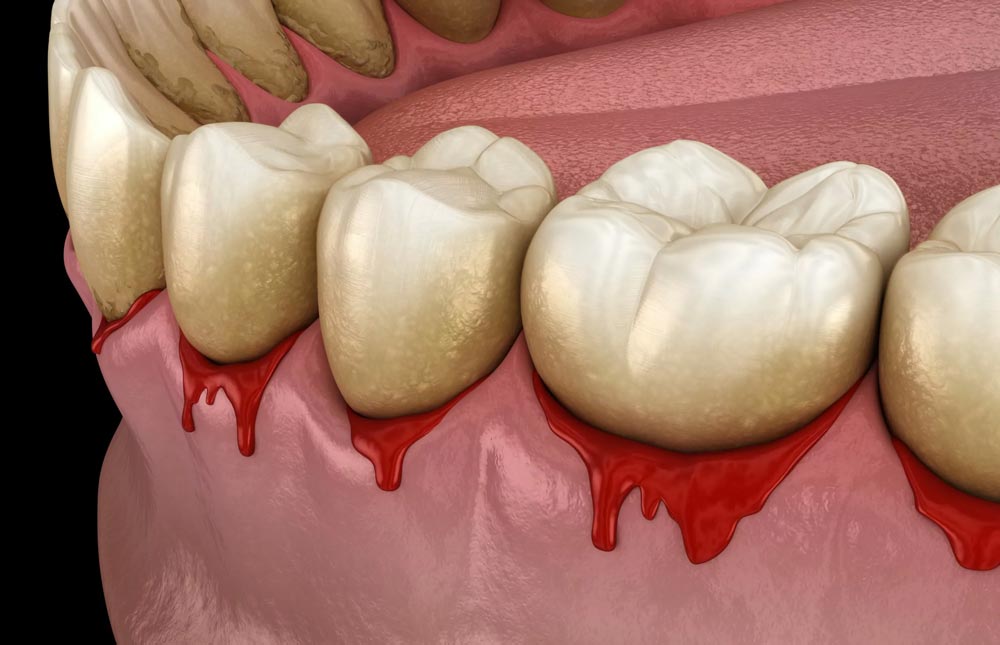
Bloody Gums Are Often a Sign of a Larger Issue
Caring for your teeth and practicing proper oral hygiene is crucial to the overall health of your teeth, gums, and mouth. Brushing your teeth at least twice a day and flossing daily are two ways to keep your mouth healthy. Whenever you do not take proper care of your oral health and do not practice good hygiene, you put yourself at risk of developing dangerous conditions. Cavities, periodontitis, discoloration, and more are just a few issues that may occur whenever you do not take care of your teeth and mouth.
Whenever you don’t care for your teeth, or if you have an underlying health condition, your mouth will begin to show signs and symptoms that there is a problem. One of the most obvious signs that your mouth’s health is in danger is when you have bloody gums. Good, healthy gums should not bleed. However, when you fail to practice good oral hygiene, your mouth may develop conditions or diseases that are accompanied by bloody gums.
The team at Cosmetic & Family Dentistry of Las Colinas cares for the oral health of all of our patients. We want to help each of them achieve a healthy and beautiful smile. While that means having your teeth regularly cleaned by a dental professional, it also involves regularly caring for them on your own. When you don’t, you may end up with symptoms, such as bloody gums.
What Causes Bloody Gums?
As you go about your day, you naturally develop a layer of plaque on the surface of your teeth. This plaque buildup can be dangerous if it is not taken care of regularly. Plaque contains germs and bacteria that attack the tissue around your teeth. By brushing and flossing your teeth, you ensure that this plaque doesn’t buildup and cause any oral problems.
However, when this plaque is not adequately removed and builds up, whether by not regularly cleaning your teeth or not properly doing it, it begins to irritate and inflame the gums around them, leading to bloody gums. Outside of blood, there are other signs that your teeth aren’t being properly cleaned, including:
- Red, swollen, and tender gums
- Bad breath
- Loose teeth
- Change in how your teeth sit in your mouth
Causes
There are many reasons for bloody gums. It could be something as simple as brushing your teeth too vigorously or with the wrong technique, or it could be something far more serious. When your gums bleed frequently, this may be a sign of an underlying oral condition. Some of these conditions include:
- Gingivitis – Gingivitis occurs when plaque buildup stays on your teeth for too long and begins to irritate the gums surrounding your teeth. If it remains for too long, it eventually becomes tartar, which worsens your bleeding. Gingivitis is characterized by bleeding, puffy gums, redness, and soreness.
- Periodontitis – Periodontal disease, also known as periodontitis, occurs when your gingivitis goes unchecked and advances. Periodontitis is an infection of your gums, jawbone, and tissue that connects your teeth and gums. It can cause your teeth to loosen and fall out.
- Diabetes – Diabetes is another condition that can cause your gums to bleed. Swollen or bloody gums are often a symptom of both Type 1 and Type 2 diabetes. Diabetes reduces your mouth’s ability to defend itself against germs that cause gum infections.
- Leukemia – Bloody gums are often a sign of leukemia. This type of cancer causes your blood platelet count to be low. These platelets are responsible for stopping your bleeding, so a lack of platelets makes it difficult to stop bleeding in all parts of your body, including your gums.
- Vitamin Deficiency – If you have a deficiency in vitamin C and vitamin K, you may also experience bloody gums. Vitamin C helps body tissue grow and repair and strengthens teeth, while vitamin K helps your blood clot properly, as well as strengthens your bones.
If you begin to notice your gums are bleeding, contact your dentist as soon as possible.
Preventing Bloody Gums
If you do have bloody gums or you just want to ensure that you never have them, there are countless ways you can do so. The best course of action is to try to stop bleeding from happening entirely, but things are sometimes out of our control. You can prevent bloody gums by:
- Practicing Good Oral Hygiene – We have already stated several times the importance of good oral hygiene. By brushing your teeth at least twice a day and flossing daily, you remove plaque buildup from your teeth. If you have a vitamin deficiency or another health condition, oral hygiene is even more essential.
- Quit Smoking – If you are a smoker, you must quit before you do even more damage to your body, including your mouth. Along with causing cancer and lung disease, smoking is also linked to gum disease. It lowers your body’s immune system, which makes it difficult to fight off infection.
- Increase Your Vitamin Consumption – Another helpful way to prevent bloody gums is by increasing your vitamin C and K consumption. Foods, such as oranges, sweet potatoes, red peppers, and carrots, are all high in vitamin C, while foods, such as spinach, kale, and other dark leafy greens, are high in vitamin K. You can also visit your doctor to find a vitamin supplement.
- Rinse Your Mouth – If you have been experiencing some bleeding, you should rinse your mouth with either hydrogen peroxide or warm salt water. Hydrogen peroxide acts as a disinfectant, removes plaque, and stops bleeding. A study found that those who rinsed with hydrogen peroxide reported less gum inflammation than the control group. Rinsing your mouth with salt water helps remove bacteria and helps clean your mouth.
Visiting Your Dentist
Visiting your dentist for a thorough dental cleaning every six months is a great way to keep your mouth healthy and clean. It also allows your dentist the chance to catch any harmful diseases before they get out of hand. If you have been experiencing bloody gums more often than normal, you should contact Cosmetic & Family Dentistry of Las Colinas and let us help.
- Awareness16
- Bad Breath1
- Bone Grafting1
- Braces4
- Causes, Symptoms, And Treatments6
- Cavities5
- Chewing Gum1
- Cosmetic Dentistry of Las Colinas15
- COVID-192
- Deep Cleaning7
- Dental Anxiety1
- Dental Bridge2
- Dental Care27
- Dental Cleaning6
- Dental Crown1
- Dental Filling1
- Dental Health24
- Dental Implants6
- Dental Sedation1
- Dental Visit1
- Dental X Ray3
- Floss1
- Gum Dieseases4
- Injury1
- Insurance1
- Invisalign8
- Oral Cancer1
- Oral Hygiene24
- Root Canal9
- Sleep Apnea2
- Tartar1
- Teeth19
- Thanksgiving1
- TMJ1
- Tongue1
- Veneers2
- White Teeth12
Get Your Best Smile With Us
